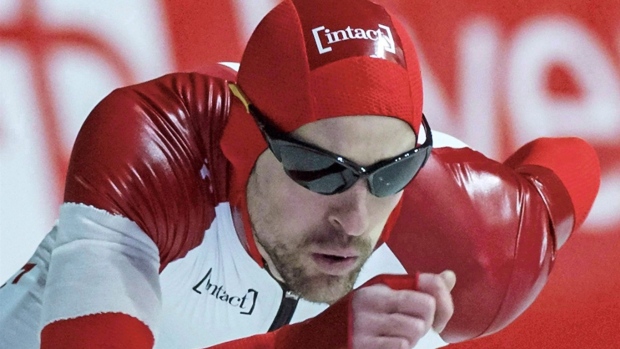Apr 25, 2016
Speedskater Morrison could be looking at 3-6 month recovery
The timeline for Canadian long-track speedskater Denny Morrison's return to the ice remained unclear Monday after he suffered a stroke over the weekend.
The Canadian Press

The timeline for Canadian long-track speedskater Denny Morrison's return to the ice remained unclear Monday after he suffered a stroke over the weekend.
Morrison was hospitalized Saturday in Salt Lake City and tests later confirmed a brain blood clot and carotid artery dissection. No surgery was required and blood thinners were not used, Speed Skating Canada said.
A federation spokesman said Monday that Morrison seems to be in good shape and is hopeful that he'll soon be able to return home. The team's medical staff have been in touch with doctors who treated Morrison in Utah and they're hoping to examine him later this week in Calgary.
Dr. Thomas L. Forbes, a professor of surgery and chair of the division of vascular surgery at the University of Toronto and the Peter Munk Cardiac Centre, said it can often take up to half a year for a blood vessel to recover in cases like this.
"The vast majority of patients — regardless of whether they're an elite athlete or a weekend warrior — will do well after a carotid dissection because these are most often related to car accidents," Forbes said. "It's usually the other injuries in the car accident that are of more concern. But this being an isolated event, certainly the odds are in his favour that he would have complete recovery and at some point would be able to return to normal activities for him.
"But again, generally it takes three to six months for these to heal on average."
The stroke came less than a year after Morrison was involved in a near-fatal motorcycle accident. He suffered a concussion, a bruised liver and kidneys, two bone fractures and a torn knee ligament.
Morrison still managed to return to action last month at the Canada Cup in Calgary. It was the final international speedskating event of the season.
The 30-year-old from Fort St. John, B.C., recently completed a month of mountain bike touring on the Arizona Trail. He was spending some free time around the Utah capital with teammate and girlfriend Josie Spence when she noticed signs he wasn't doing well.
Spence, a certified lifeguard, drove him to hospital and advised medical staff with the national team.
It wasn't immediately clear whether Morrison had a recent fall or any kind of trauma.
"It would be unusual that this would be the first symptoms of a carotid dissection that occurred 11 months ago," Forbes said. "More mild levels of trauma can cause these. So whether while biking there was a hyperextension of his neck or twisting of his neck or even a fall during the biking, it could be something like that."
Morrison and Spence were not available for comment.
A carotid dissection occurs when blood burrows between the layers of a blood vessel, Forbes said. It can occur anywhere in the body but the carotid artery is a common area.
"Most commonly it occurs after trauma," he said. "The most common time we'll see it is in the early stages after a car accident where there is a significant sort of whiplash-type mechanism. They can also occur spontaneously in people who have not had trauma.
"But with those people then we're concerned about some of kind of underlying abnormality of their blood vessels — like a connective tissue disorder."
The chances of having a similar issue in the future don't usually occur in cases like this, Forbes added.
"Generally not, unless someone was in the very small proportion of the population that had an underlying problem with their arteries ... but I would bet against that with (Morrison) given he's been an elite athlete for so many years."
The Canadian long-track speedskating team begins off-ice training next week. On-ice work will likely start in June and the season traditionally begins in early fall.
Morrison has won four Olympic medals over his career, including a team pursuit gold at the 2010 Vancouver Games.
———
Follow @GregoryStrongCP on Twitter.
